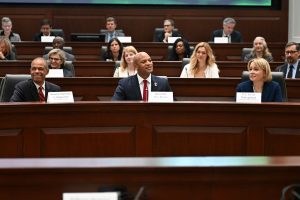Maryland has nation-leading extended producer responsibility initiative to cut waste and generate 2,000 jobs
ANNAPOLIS, MD (October 29, 2025) – Governor Wes Moore today hosted representatives from the European Union, Maryland business executives and policy experts for the first-ever Circular Economy Forum.
The forum, co-hosted by the Delegation of the European Union to the United States, the State of Maryland, and the City of Annapolis, brought together state leaders, diplomats, business executives, and experts from both sides of the Atlantic to advance a shared vision for a circular economy—one that redirects valuable resources, creates jobs, and promotes healthier communities.
“Maryland is proud to stand shoulder-to-shoulder with our European partners in shaping a future where our work to grow the economy and protect our environment go hand in hand,” said Gov. Moore. “A circular economy means building prosperity while protecting our people and our planet. In partnership, we will continue to create new jobs, grow wealth for Maryland families, and protect our water, air, climate, and ecosystems for generations to come.”
Governor Moore and European Union Ambassador to the United States Jovita Neliupšienė opened the full-day event, which included discussions on policy, innovation, and financing strategies to build a more sustainable and competitive economy. The forum highlighted how circular approaches—such as designing products for reuse, reducing reliance on scarce resources, and expanding recycling and recovery systems—can reduce waste. According to a study commissioned by the State of Maryland, a well-designed program to extend producer responsibility could increase the state’s recycling rate from 34% to over 50%, generate $202 million in material value, reduce over 1 million metric tons of carbon emissions, and create more than 2,000 jobs.
“The European Union and Maryland have each embarked on a path towards a more competitive economy, one which turns waste into resources, creates new jobs and strengthens our supply chains,” Ambassador Neliupšienė said. “In addition to environmental benefits, circular business models will bring a competitive advantage in transatlantic trade and investment to companies in Maryland and in the EU.”
Extended producer responsibility is a model that shifts the cost of managing resource recovery and diversion away from taxpayers and onto the companies that manufacture and sell products. By holding producers accountable for the full lifecycle of their goods, this approach saves public dollars that can be reinvested into communities.
“This gathering shows what’s possible when we think big and work together,” said Maryland Environment Secretary Serena McIlwain. “Extended producer responsibility is about fairness—it ensures that the companies who design and profit from products also take responsibility for their end of life. By embracing this approach, Maryland is protecting our environment, saving taxpayers money, and opening the door to new jobs and innovation. Today’s partnership with the European Union is proof that Maryland can lead nationally while learning from global best practices.”
Sessions will explore opportunities for collaboration in areas such as packaging, construction, textiles, and critical minerals, as well as financing tools to scale up circular economy initiatives.
###

